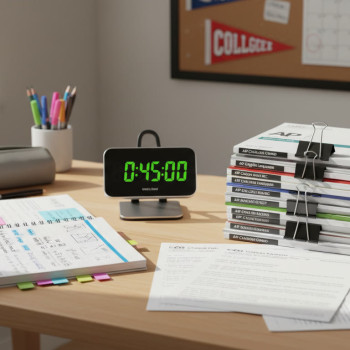Why This Matters: Two Calendars, One Student
Parents, picture this: your teenager is juggling school projects, AP coursework, college planning, and—woven through the school year—cultural and religious rhythms that shape daily life. In the Middle East, Ramadan and other festivals change routines in ways that can either disrupt or enrich a student’s AP preparation. This guide helps you translate those rhythms into a realistic plan so your child can approach AP Weeks with confidence, calm, and the right supports.

Start with the Big Picture: What Are AP Weeks?
AP Weeks are the specific exam periods when College Board administers Advanced Placement exams. Traditionally these fall in the first two weeks of May, with a late-testing window shortly after. For families, these weeks are high-stakes but also highly predictable: once you know the dates, you can shape study calendars, mock exams, and rest days around them.
Why AP timing matters for families in the Middle East
Because AP Weeks occur in May, they sometimes intersect with spring school terms, national holidays, and in certain years may land near or after Ramadan or other festivals. The timing affects sleep schedules, meal times, travel plans, and even the emotional tenor of the household. Smart planning turns potential conflict into a strategic advantage.
Understanding Ramadan and Festival Rhythms
Ramadan is a lunar month: start dates shift about 10–12 days earlier each Gregorian year. Other festivals—like Eid al-Fitr and Eid al-Adha—follow this lunar rhythm or are tied to the Islamic calendar, while national holidays (independence days, national weeks) vary by country. The upshot: the seasonal placement of religious and civic festivals moves through the calendar, so some years will see Ramadan in spring, others in winter or summer.
Typical effects of Ramadan on daily life
- Altered meal timing: Suhoor (pre-dawn) and Iftar (post-sunset) mean students may sleep at different times than usual.
- Concentrated family activities after sunset: more meetings, dinners, and religious observances.
- Potential daytime fatigue for fasting students who still maintain regular school schedules.
- Shortened business hours or quieter daytime social life in some communities.
How to Map Festivals Against AP Weeks
Step 1: Gather the fixed dates you know—your school’s AP Week schedule, exam times for subjects your child will take, and your family’s local holiday calendar. Step 2: Overlay movable religious dates (Ramadan/Eid) using a reliable lunar calendar for the year in question. Step 3: Highlight overlapping days and build a flexible plan that honors both academic goals and family values.
Practical planning template (monthly view)
| Month | Focus | Key Actions |
|---|---|---|
| Two months before AP Weeks | Peak review and diagnostics | Simulated tests, identify weak spots, schedule tutoring sessions, adjust sleep schedule |
| One month before | Consolidation and stamina | Short daily practice, timed sections, light content review, plan rest days during festival periods |
| AP Weeks | Execution | Strict sleep hygiene, healthy meals, calm transportation, supportive household routines |
| After exams | Recovery and reflection | Celebrate, decompress, analyze performance with tutors |
Concrete Strategies—Before, During, and After
Before AP Weeks: build the rhythm
Start early. Two to three months before the exams is when focused practice offers the highest ROI. For students observing Ramadan, shifting the most demanding academic tasks to late evening after Iftar (when energy often rebounds) or to early morning hours before school or fasting begins can be a game-changer.
- Design a two-hour “power block” for intense study each day—ideally when the student is naturally more alert.
- Use a weekly checklist: content review, mixed practice, timed section, vocabulary/fluency drill.
- Schedule one full-length practice exam each week under real timing conditions to build stamina.
- Book a few targeted 1-on-1 tutoring sessions for stubborn topics. Personalized support that adapts to your child’s pace—like Sparkl’s 1-on-1 guidance and tailored study plans—helps reduce wasted study time and sharpen weaknesses efficiently.
During Ramadan: adapt without losing momentum
When fasting, energy peaks and troughs are normal. Rather than forcing long study stints in the afternoon slump, break study into shorter focused bursts around Suhoor and after Iftar. Keep nutrition balanced and hydrating during non-fasting hours. Emotional support matters: validate that the student’s rhythm feels different and normalize small adjustments.
- Move practice tests to late evening or early morning hours whenever possible.
- Shorten sessions to 25–45 minutes with clear, high-yield goals (e.g., one practice FRQ, one discrete math packet).
- Prioritize sleep—help your teen aim for consistent blocks (even if shifted) rather than fragmented naps.
- Use quiet, low-energy family rituals that support study—gentle accountability rather than pressure.
During AP Weeks: logistics and wellbeing
Exam day logistics matter as much as knowledge. Confirm testing times, routes to school, and required materials well in advance. Plan light, nutrient-dense meals for students who are not fasting; for fasting students who must take an AP exam, coordinate with the school to determine possibilities for rest or hydration if allowed. Keep pressure low—your calm is contagious.
- Print exam day checklists: ID, pencils, permitted calculator, watch or device if allowed locally.
- Plan quiet pre-exam rituals: a brief review of a single concept, a 5–10 minute breathing exercise, or a short walk.
- Ensure transportation arrives early—unexpected delays magnify stress.
- Respect religious observance: if a student chooses to fast, discuss with them and their coordinator ahead of time to decide the best approach.
Sample Weekly Plan When Ramadan Overlaps with AP Prep
Here is a flexible, realistic weekly routine for a student observing Ramadan and preparing for AP exams. Tweak timing to match your family’s sunset/sunrise.
| Time | Activity | Goal |
|---|---|---|
| 03:30–04:30 (Suhoor/Early Morning) | Short review or problem set | Quiet focus on difficult concepts while mind is fresh |
| 08:00–15:00 (School/Day) | Regular school; small breaks for light revision | Conserve energy; single 20-minute review after classes |
| Sunset (Iftar)–20:30 | Nutrition and family time | Refuel emotionally and physically |
| 20:30–22:30 | Power study block | Practice problems and targeted tutoring session (if scheduled) |
| 22:30–00:00 | Wind down and light review | Consolidate what was learned; plan next day |
How to Keep Motivation and Mental Health Strong
AP season is emotionally charged. Add festivals and fasting, and the stakes feel bigger. Your role as a parent is to hold steady: foster a positive environment, model calm, and help your teen see progress rather than perfection.
Simple, effective mental health tips
- Replace “must” with “could”: offer choices about study times and breaks to maintain autonomy.
- Celebrate small wins: a completed practice exam or a new problem type mastered deserves recognition.
- Schedule mini-rewards—family game night, a favorite dessert after an exam, or a restful afternoon.
- Consider brief guided relaxation or breathing practices before tests to reduce anxiety.
Practical Communication Strategies Between Parents, Students, and Schools
Open, early communication is your superpower. Reach out to your AP coordinator and teachers at the start of the year (or as soon as festival overlaps become clear). Discuss accommodations that make sense—adjusted practice times, notes about fasting, or quiet spaces for late-night study during Ramadan.
What to ask your school or AP coordinator
- Exact AP exam times and any local variations in scheduling.
- Policies around late arrivals or religious observances on test days.
- Availability of study rooms, extended library hours, or supervised study halls during festival periods.
- Recommendations for exam-day rules concerning food, medications, or breaks.
When to Bring in Extra Help—and What That Looks Like
Many capable students hit a plateau; that’s when targeted support pays off. One-on-one tutoring provides tailored strategies, immediate feedback, and accountability. If your teen is juggling fasting or festival responsibilities, a flexible tutoring schedule that adapts to those rhythms becomes especially valuable.
Red flags that a student could benefit from tutoring
- Consistent errors on the same topic despite study.
- Falling scores on practice exams or timed sections.
- High anxiety that interferes with test performance.
- Difficulty translating classroom learning into exam-style answers.
If you’re considering tutoring, look for programs that offer expert tutors, individualized study plans, and adaptive tools that learn from the student’s performance. Mentioned naturally in family conversations, Sparkl’s personalized tutoring—1-on-1 guidance, tailored study plans, and AI-driven insights—can help pinpoint where the student spends their limited study hours for maximum improvement.
Real-World Examples and Scenarios
Example 1: Lina, a high school junior in a major city, had Calculus AB scheduled two weeks after Ramadan ended. Her parents prioritized weekly 90-minute evening sessions with a tutor during Ramadan’s later nights. Because the tutor matched the family’s rhythm and used targeted problem sets, Lina entered AP Week with better timing skills and less stress.
Example 2: Ahmed was fasting and had a morning AP exam. His family discussed options with the school: Ahmed chose to refrain from fasting the morning of the exam with his family’s religious guidance, ate a light pre-dawn meal, and used a calming breathing routine before entering the exam. He performed comfortably and recovered by celebrating with family afterwards.
Comparing approaches: single long study block vs. multiple short blocks
| Approach | Best For | Pros | Cons |
|---|---|---|---|
| Single Long Block (2–3 hours) | Non-fasting students with consistent energy | Deep focus, good for full-length practice exams | Harder during Ramadan, risks fatigue |
| Multiple Short Blocks (25–60 min) | Fasting students or those with variable schedules | Flexible, easier to sustain energy, better retention with spaced practice | Requires discipline to start and stop; less ideal for full-length practice |
Checklist: Two Months Out, Two Weeks Out, Exam Week
Use this checklist to keep things practical and manageable. Put it on the fridge or a shared calendar.
- Two months out: schedule practice exams, book targeted tutoring sessions, confirm school ordering and registration details.
- Two weeks out: taper intensely—drop new content, focus on practice and timing; finalize exam-day transportation and meals.
- Exam week: keep routines steady, prioritize sleep, simplify meals, and maintain emotional support.
After the Exams: Recovery, Reflection, and Next Steps
Celebrate effort. Decompress before diving into score analysis. When scores arrive, reflect on what worked and what didn’t—study rhythms, tutoring interventions, and timing strategies. If your student needs to retake or bolster a subject, use your observations to improve the plan: maybe daytime tutoring is better, or perhaps shorter, more frequent sessions are the key.
How to review scores constructively
- Focus on patterns in practice and exam performance rather than single numbers.
- Ask: Were timing mistakes, conceptual gaps, or careless errors the main issue?
- Consider continued targeted tutoring to strengthen persistent weak spots.
Final Thoughts: A Partnership Across Calendars
Balancing Middle Eastern festival calendars and AP exam weeks is not about choosing one priority over another. It’s about designing a compassionate, practical plan that respects cultural rhythms and maximizes academic success. With thoughtful scheduling, open communication with schools, and targeted supports—like personalized, one-on-one tutoring and AI-informed study plans—your teen can walk into AP Weeks prepared, rested, and confident.

Remember: your steady presence, realistic expectations, and willingness to adapt are the single most powerful resources your child has. Festivals and fasting are part of a student’s identity and can coexist with deep academic work when approached thoughtfully. If you’d like help turning this plan into a personalized day-by-day schedule for your family’s exact calendar, consider setting up a short diagnostic session with a tutor who understands both AP demands and regional rhythms—small investments now often pay off in reduced stress and stronger outcomes.
Quick Resources to Keep on Hand
- School AP coordinator contact details and exam schedule
- Local lunar-calendar dates for Ramadan and Eid for the year in question
- List of required AP exam materials and local test center rules
- Names and contact info of any tutors or mentors supporting your student
Wishing you and your student a calm, confident AP season—one that honors both cultural traditions and academic goals. When rituals and exams align thoughtfully, students often find a deeper resilience and focus than they imagined possible.
















No Comments
Leave a comment Cancel